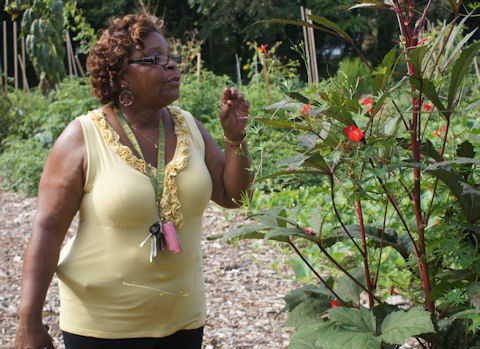About Bacon’s Rebellion
Bacon's Rebellion is Virginia's leading independent portal for news, opinions and analysis about state, regional and local public policy. Read more about us here.
Laboring in the Garden of the Lord
 A church in Richmond's inner city does more than minister to the homeless and hungry. Volunteers tend an urban garden to feed them fresh, healthy food.
A church in Richmond's inner city does more than minister to the homeless and hungry. Volunteers tend an urban garden to feed them fresh, healthy food.
by James A. Bacon
When Linda Marshall retired from her job as a taxpayer advocate with the Internal Revenue Service, she enrolled in Henrico County's Master Gardener program. She was thinking that she would apply her skills to working on the yard around her house. Little did she reckon on Morris Henderson, the pastor of her church, the 31st Street Baptist Church.
The church had launched an urban garden to grow fruits and vegetables for its nutrition center, which fed dozens of homeless and hungry people in the inner-city Richmond community. The woman who had started the garden was quite elderly. Wouldn't it be wonderful, Henderson suggested, if Marshall could take over the job?
After earning her certification, the 62-year-old Marshall found herself in charge of the garden. And she's been volunteering her time almost every day since -- Mondays through Fridays and some Saturdays as well -- not to mention the time of her husband, her sister and anyone else she can corral into the job. "I feel like it's a God-ordained appointment," she says.
You name it, and the 31st Street Baptist Church grows it: strawberries, blueberries and melons, an endless assortment of vegetables, and a wide variety of herbs. The deacon in the nutrition center says what he needs for his menus, and Marshall and other volunteers plant it. When the plants ripen, she takes the bounty over to the church, about one block away.
A month ago I profiled the work of Tricycle Gardens, which, like the 31st Street Baptist Church, is located in Richmond's Church Hill district. The mission of Tricycle Gardens is to help eradicate the "food desert" -- the lack of healthy food, especially fruit and vegetables -- in the inner city. While I enthusiastically applaud the work that Tricycle Gardens was doing, I cannot escape the observation that the group consists primarily of well-meaning white professionals and that the population whose health they hope to improve is comprised mainly of poor and working-class African-Americans. I wondered, does the message of eating locally grown fruits and vegetables resonate outside the college-educated elite?
 The answer is, yes it does. The 31st Street Baptist Church has supported a nutrition center for many years as part of its mission of serving the poor, says Pastor Henderson. The center feeds between roughly 50 and 150 people every weekday, the number falling during the school year when children qualify for school lunch programs. The food is donated by parishioners, the Food Bank and other groups. Much of it comes in cans and boxes. Fresh food contributions are unpredictable. And ever since the closure of the old Community Pride neighborhood grocery store on 25th Street, fresh food was unavailable anywhere in Church Hill. Inspired by First Lady Michelle Obama, her White House garden and her campaign against obesity, Henderson says, he had the vision of giving the homeless "a balanced meal with fresh fruits and vegetables that are raised in the community."
The answer is, yes it does. The 31st Street Baptist Church has supported a nutrition center for many years as part of its mission of serving the poor, says Pastor Henderson. The center feeds between roughly 50 and 150 people every weekday, the number falling during the school year when children qualify for school lunch programs. The food is donated by parishioners, the Food Bank and other groups. Much of it comes in cans and boxes. Fresh food contributions are unpredictable. And ever since the closure of the old Community Pride neighborhood grocery store on 25th Street, fresh food was unavailable anywhere in Church Hill. Inspired by First Lady Michelle Obama, her White House garden and her campaign against obesity, Henderson says, he had the vision of giving the homeless "a balanced meal with fresh fruits and vegetables that are raised in the community."
As it happened, the church had acquired three parcels of property nearby with the original goal of building a neighborhood center there. When a downturn in the economy scotched that idea, the church decided to convert the parcels into three gardens: one for food, one for flowers and one for zen-style meditation to provide a haven of peace and tranquility in the gritty urban neighborhood. The vegetable garden was the first to open. Next came the flower garden. For now the church has held off on the meditation garden, which requires significant funds to pay for landscaping.
The church encourages the homeless and hungry who partake of its food to volunteer in the garden. For the first two years, the nutrition center beneficiaries were active. More recently, the church has forged relationships with community groups that emphasize youth involvement. Marshall rattles off a string of organizations -- the Cub Scouts, Boy Scouts, Girl Scouts, Youth Empowerment, Camp Diva and the Mayor's Youth Academy (MYA) -- who send a stream of volunteers.
The MYA program is especially ambitious. Inner city youths participate in every step of the gardening: creating the beds, building the soil, planting the seeds, watering and weeding, and the final harvest. They take ownership of their own beds, and they sell the harvest in farmers market. The proceeds help underwrite a small stipend for the participants.
The gardens are "a work in progress," says Marshall. It was a big step forward this summer when the City of Richmond installed a water outlet for the vegetable garden, sparing the necessity of running a hose from the church across a parking lot and across the street. Now she is planning to raise new crops like mushrooms and figs.
Urban gardening poses special challenges. Due to high levels of lead and arsenic in the soil, gardeners must lay down a plastic barrier, upon which they build raised beds. The gardens also are subject to occasional pilferage. "There are people who come and take what they want," says Marshall. When that happens, she recalls the story in the Book of Ruth in which the wealthy landowner permitted Ruth to glean from his garden. "If you're hungry, we don't mind you coming in and gleaning," she says, adding, "But I would like you to volunteer."
At times Marshall sounds a little weary from the heavy burden she has assumed. She's looking forward to another member of the congregation earning a Master Gardener certificate and taking over some of her duties, she says. But then she perks up. "I'm eating better because I'm eating out of the garden. I'm exercising. I'm losing weight."
"I'm doing the labor of the Lord," she says. "We'll be working in the garden until Jesus comes."
This article was written under a sponsorship of Bon Secours Virginia Health System.

